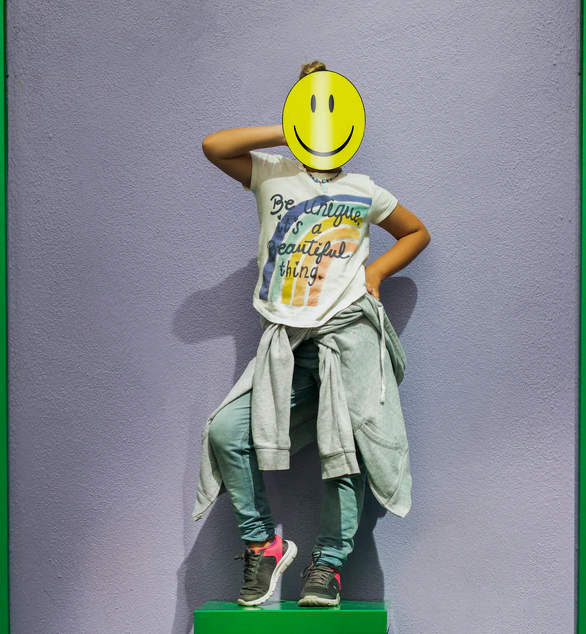Social distancing, mask wearing, and self-isolation have become an accepted norm in many parts of the world since the emergence of the COVID-19 pandemic. The latest science reports, including a scientific article from the Journal of American Medical Association (JAMA) “Universal Masking to Prevent SARS-CoV-2 Transmission—The Time Is Now,” clearly articulates the effectiveness of mask wearing, and calls for all Americans to comply. There is a clear correlation among wearing a mask, compliance with social distancing and the spread of COVID-19 (SARS-CoV-2).
The responsible thing to do is: wear your mask in public. I do, and I encourage everyone to.
But let’s also talk about the unseen consequences of wearing a mask . . . and what you can do about it.
Mask wearing a face mask is uncomfortable but it is for personal safety and the safety of others that we do so. Aside from physical difficulties (such as breathing problems), there are hidden psychological factors that need to be brought into public awareness so that we can do our best to compensate for them. Beyond the mere discomfort of wearing a mask, we are actually making it difficult to connect with other human beings.
The Center for Disease Control (CDC) addresses public health risks but not the psychological implications of mask-wearing. Because we “read” other people’s faces without even being aware that we are doing so, covering your face means other people can’t read you either.
People who rely on lip-reading to communicate are especially impacted by others wearing masks. They simply can’t “see” what they are saying. And for people who don’t hear well it is important for to remember to speak loudly and clearly enough to be heard easily. It’s the polite and integrous thing to do.
Wearing a Mask is Like Putting a Blindfold on Your Ventral Vagus Nerve (the Nerve of Compassion)
The necessary precaution of mask-wearing creates a pandemic of its own. We are being cut off from social connections in public places because, in large part, we cannot read the emotional landscape around us. This matters because social connection helps us reduce anxiety and fears surrounding the pandemic. When we feel more isolated our fears and anxieties heighten–the last thing we need.
What Does My Nervous System Have to Do with Wearing a Mask?
One of the most important jobs of the nervous system is to keep you alive; it continuously scans for threats to your safety and cannot distinguish between real and perceived threats, such as needless fear and worry. Nervous system response happens below your conscious awareness and is referred to as “neuroceptions,” a term coined by Porges. The rational brain is typically bypassed when the nervous system assesses someone’s face, for example, to determine if they are safe or a threat. Think angry boss, road rage, or worse. Porges explains, “Because of our heritage as a species, neuroception takes place in the primitive parts of the brain, without our conscious awareness” (Porges, 2011, p. 11).
When you cover your face with a mask, your nervous system cannot read the facial expressions of another person. Our nervous system works below our conscious awareness and when we can’t see someone’s face, we can’t adequately read “cues of safety and cues of danger.”
Our social engagement systems have been compromised and it is important to find other ways to socially engage, especially if you live alone.
As modern humans, our first defense against threats is social engagement. When we have a problem we call home, a friend, or in pre-Covid times, even pull up a seat at the bar (preferably a juice bar). We want to talk our problems through with someone who will listen and reflect back to us in an empathetic manner. Even if we know that no one can solve our problems, we still want to be listened to and validated.

Facial expression is universal and your facial muscles (striated) are wired to your vagus just as your heart is. The vagus nerve is the 10th cranial nerve and provides two-way communication between the major organs of the body and the brain. Facial expressions and your heart are closely linked.
Without saying a word, we know if someone is feeling compassion, empathy, or conversely, a threatening emotion such as anger or hostility. Much of our one on one communication is below our conscious awareness! The nervous system has the ability to bypasses the rational processing functions of the brain but your body is keeping score, a term coined by Bessel Van der Kolk, MD.
Facial expression and personal identity is greatly diminished when we wear a mask because the portion of your face that gets covered is the striated muscles below the eyes responsible for facial expression. When we cannot automatically, and nearly instantaneously, assess a person’s intentions based on their facial cues we enter into feelings of social disconnectedness, and isolation (Porges). When the nervous system cannot “read” facial cues we begin to feel cut off from other people. Many of us feel like we’re walking around like zombies.
When we cannot get emotional comfort (co-regulation) from social sources, our bodies move on to the next older evolutionary part of the nervous system: mobilization (Porges).
Mobilization is also known as the fight/flight response of the sympathetic nervous system. You may feel this as anxiety, a racing heart, aggression, or the need to get away. As the name implies, the flight/fight sympathetic nervous system prepares us to mobilize and take action.
But when you’re dealing with fear-based stress and anxiety there is really no one to fight and nowhere to go! Your body is working in overdrive mode and you are exhausting yourself. Sound familiar? The nervous system is inextricably linked to your hormonal and immune systems as they work hand in hand. Stress hormones get released and the immune response activates in the fight/flight mode.
A lot of precious resources are being used with no solution to fear and anxiety in sight. When the sympathetic nervous system fails to secure our survival from perceived or real threats, the third and oldest in the evolutionary chain takes over: the immobilization response. This portion of the vagus nerve is called the dorsal vagus nerve is the most primitive part of our nervous system. When activated, your body will “freeze” or feign death as a last resort to protect itself.
Please Remember:
- Speak clearly and in a friendly tone and cadence
- Make eye contact with people and say “hello” with your eyes (we need friendliness now!)
- Join online events, especially if you live or work alone, to maintain social contact where you can see other peoples’ entire faces
- Masks are dehumanizing, remember that there is a real person with feelings behind the mask

Footnote:
Brooks JT, Butler JC, Redfield RR. Universal Masking to Prevent SARS-CoV-2 Transmission—The Time Is Now. JAMA. Published online July 14, 2020. doi:10.1001/jama.2020.13107

